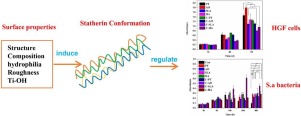当前位置:
X-MOL 学术
›
Colloids Surf. B Biointerfaces
›
论文详情
Our official English website, www.x-mol.net, welcomes your feedback! (Note: you will need to create a separate account there.)
Effects of statherin on the biological properties of titanium metals subjected to different surface modification.
Colloids and Surfaces B: Biointerfaces ( IF 5.8 ) Pub Date : 2020-01-16 , DOI: 10.1016/j.colsurfb.2020.110783 Xugang Lu 1 , Shibing Xiong 1 , Yangmei Chen 1 , Fenghua Zhao 1 , Yi Hu 1 , Yuqiang Guo 1 , Boyao Wu 1 , Ping Huang 2 , Bangcheng Yang 3
Colloids and Surfaces B: Biointerfaces ( IF 5.8 ) Pub Date : 2020-01-16 , DOI: 10.1016/j.colsurfb.2020.110783 Xugang Lu 1 , Shibing Xiong 1 , Yangmei Chen 1 , Fenghua Zhao 1 , Yi Hu 1 , Yuqiang Guo 1 , Boyao Wu 1 , Ping Huang 2 , Bangcheng Yang 3
Affiliation

|
The failure of dental implants is usually caused by bacteria infection, poor bioactivity and biocompatibility. It is a common phenomenon clinically. Statherin, a salivary protein, plays a crucial role of mediator between materials and cells/bacteria. However, the conformation of statherin might be changed by the implants in vivo. In this study, we investigated the effects of statherin on the bioactivities, antibacterial abilities and biocompatibilities of the titanium metals and the reaction mechanism. We found that the conformation of statherin was mainly influenced by surface composition, surface structure, surface roughness, surface hydrophilia and Ti-OH groups of materials. Statherin could decrease the cell biocompatibility of the titanium metals including pure titanium (PT), anodic oxidation (AO), sandblasting and etching (SLA) and plasma spraying hydroxyapatite (HA) coating in HGF cell experiments, regulate the bio-mineralization ability of HA coating in SBF, and enhance the antibacterial properties of PT and HA coating. This study revealed that surface properties of materials could change the conformation of statherin, which influenced the bioactivities, antibacterial properties and biocompatibilities of the materials in return.
中文翻译:

斯达汀对不同表面改性的钛金属生物学特性的影响。
牙植入物的失败通常是由细菌感染,不良的生物活性和生物相容性引起的。这是临床上的常见现象。唾液酸蛋白Statherin在物质与细胞/细菌之间起着重要的中介作用。但是,体内植入物可能会改变他汀的构象。在这项研究中,我们调查了他汀对钛金属的生物活性,抗菌能力和生物相容性的影响及其反应机理。我们发现,伐他汀的构象主要受材料的表面组成,表面结构,表面粗糙度,表面亲水性和Ti-OH基团的影响。Statherin可能会降低钛金属的细胞生物相容性,包括纯钛(PT),阳极氧化(AO),在HGF细胞实验中进行喷砂和蚀刻(SLA)以及等离子喷涂羟基磷灰石(HA)涂层,调节HA涂层在SBF中的生物矿化能力,并增强PT和HA涂层的抗菌性能。这项研究表明,材料的表面性质可能会改变动物甾烷素的构象,从而影响材料的生物活性,抗菌性和生物相容性。
更新日期:2020-01-17
中文翻译:

斯达汀对不同表面改性的钛金属生物学特性的影响。
牙植入物的失败通常是由细菌感染,不良的生物活性和生物相容性引起的。这是临床上的常见现象。唾液酸蛋白Statherin在物质与细胞/细菌之间起着重要的中介作用。但是,体内植入物可能会改变他汀的构象。在这项研究中,我们调查了他汀对钛金属的生物活性,抗菌能力和生物相容性的影响及其反应机理。我们发现,伐他汀的构象主要受材料的表面组成,表面结构,表面粗糙度,表面亲水性和Ti-OH基团的影响。Statherin可能会降低钛金属的细胞生物相容性,包括纯钛(PT),阳极氧化(AO),在HGF细胞实验中进行喷砂和蚀刻(SLA)以及等离子喷涂羟基磷灰石(HA)涂层,调节HA涂层在SBF中的生物矿化能力,并增强PT和HA涂层的抗菌性能。这项研究表明,材料的表面性质可能会改变动物甾烷素的构象,从而影响材料的生物活性,抗菌性和生物相容性。


























 京公网安备 11010802027423号
京公网安备 11010802027423号